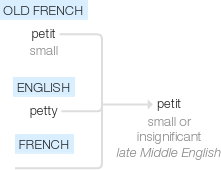Petit
late Middle English (in the sense ‘small or insignificant’): from Old French, ‘small’; the same word as petty, with retention of the French spelling.
wiktionary
From Middle English petit, from Old French petit, from Latin *pitittus, diminutive of Latin *pit-, possibly from Proto-Celtic *pett-(“part, bit, piece”). Compare also Latin pitinnus(“small”), pitulus. Doublet of petty.
From French petit(“ brevier”) directly or via German Petit(“ brevier”).
etymonline
petit (adj.)
late 14c., "small, little; minor, trifling, insignificant," from Old French petit "small, little, young, few in numbers" (11c.), which is probably from the stem of Late Latin pitinnus "small," a word of uncertain origin; it corresponds to no known Latin form and perhaps is from a Celtic root pett- "part, piece, bit" also found in Italian pezza, English piece.
Attested as a surname from 1086. Replaced by petty in most usages, except in established forms such as petit bourgeois "conventional middle-class" (1832; used in English by Charlotte Brontë earlier than by Marx or Engels); petit mal ("mild form of epilepsy," 1842, literally "little evil"); petit-maître ("a fop, a dandy," 1711, literally "little master"); and petit four "small, fancy dessert cake" (1884), which in French means "little oven," from Old French four "oven," from Latin furnus. In Middle English a petiteskole (mid-15c.) was a school for young children.
